Embarking on Your Journey to Becoming a BCBA
The pathway to becoming a Board Certified Behavior Analyst (BCBA) is a structured process that requires academic achievement, practical experience, and certification examinations. This comprehensive guide explores the prerequisites, coursework, certification procedures, and ongoing professional standards essential for aspiring behavior analysts. Whether beginning with an undergraduate degree or advancing to a doctoral level, prospective BCBAs must adhere to stringent standards set by the Behavior Analyst Certification Board (BACB), ensuring competence and ethical practice in the field.
Foundational Educational Requirements and Prerequisites
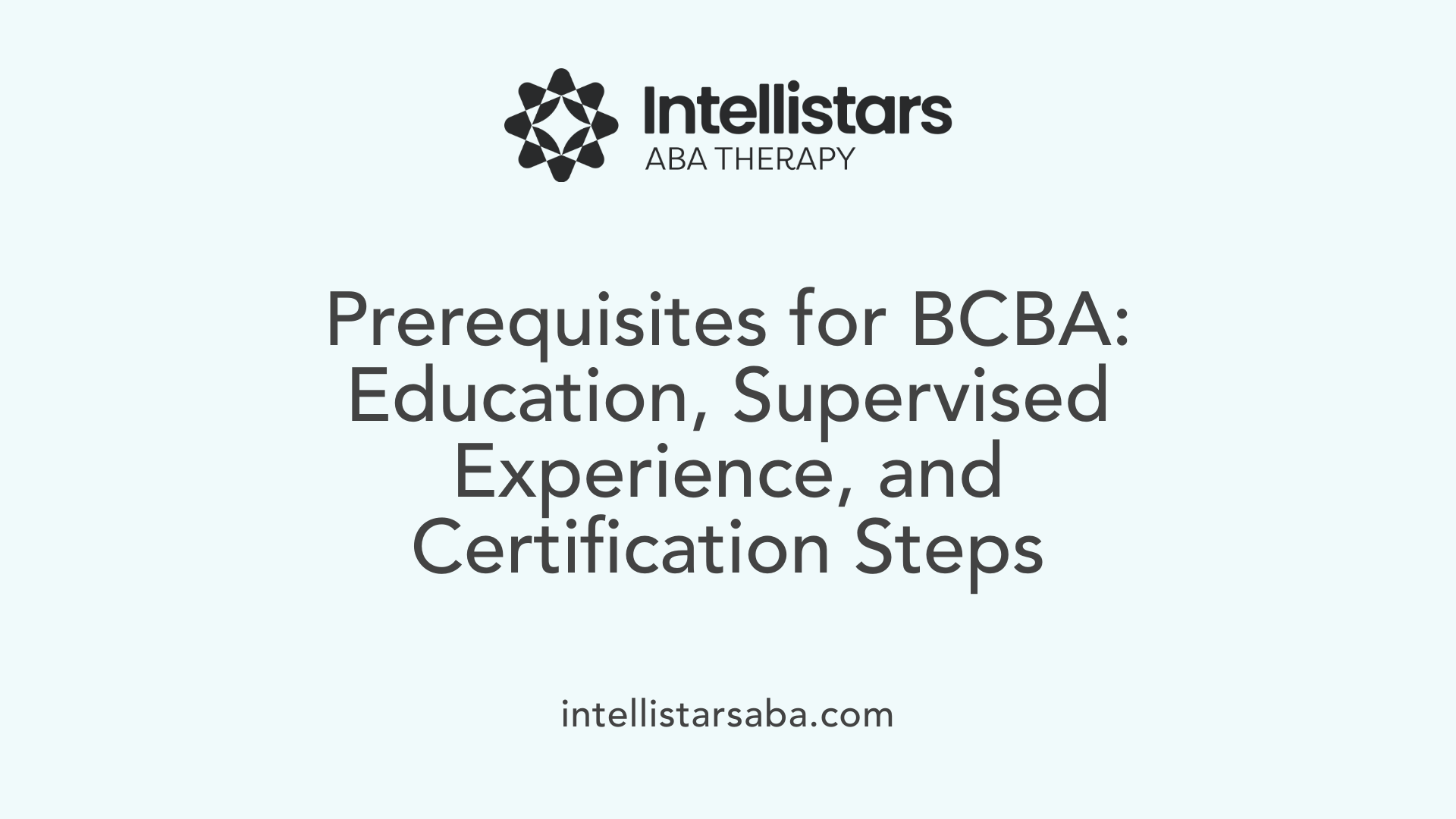
What are the requirements and prerequisites for BCBA certification?
Becoming a BCBA (Board Certified Behavior Analyst) involves several educational and experiential steps. First, candidates must earn a master's degree or higher from an accredited program recognized by the Behavior Analyst Certification Board (BACB). This degree should include coursework in key behavior analytic topics such as ethics, behavior change procedures, research methods, and the conceptual foundations of behavior analysis. Typically, this coursework totals around 270 hours.
In addition to education, prospective BCBAs are required to complete between 1,500 and 2,000 hours of supervised practical experience in applied behavior analysis (ABA). This fieldwork must be conducted under the supervision of qualified professionals and adhere to strict documentation standards.
After fulfilling education and supervised experience requirements, candidates must pass a comprehensive exam. This exam, lasting four hours, consists of 150 multiple-choice questions based on the BACB's Test Content Outline. Successfully passing the exam grants BCBA certification.
Maintaining the certification involves continuing education units (CEUs), ongoing supervision, and renewal procedures mandated by the BACB. These steps ensure that BCBAs stay current with best practices and ethical standards in behavior analysis.
Overall, the pathway to BCBA certification ensures that professionals possess a solid foundation in behavior analysis theory, practical skills through supervised experience, and a commitment to ongoing professional development.
Educational Pathways and Coursework for BCBA Certification
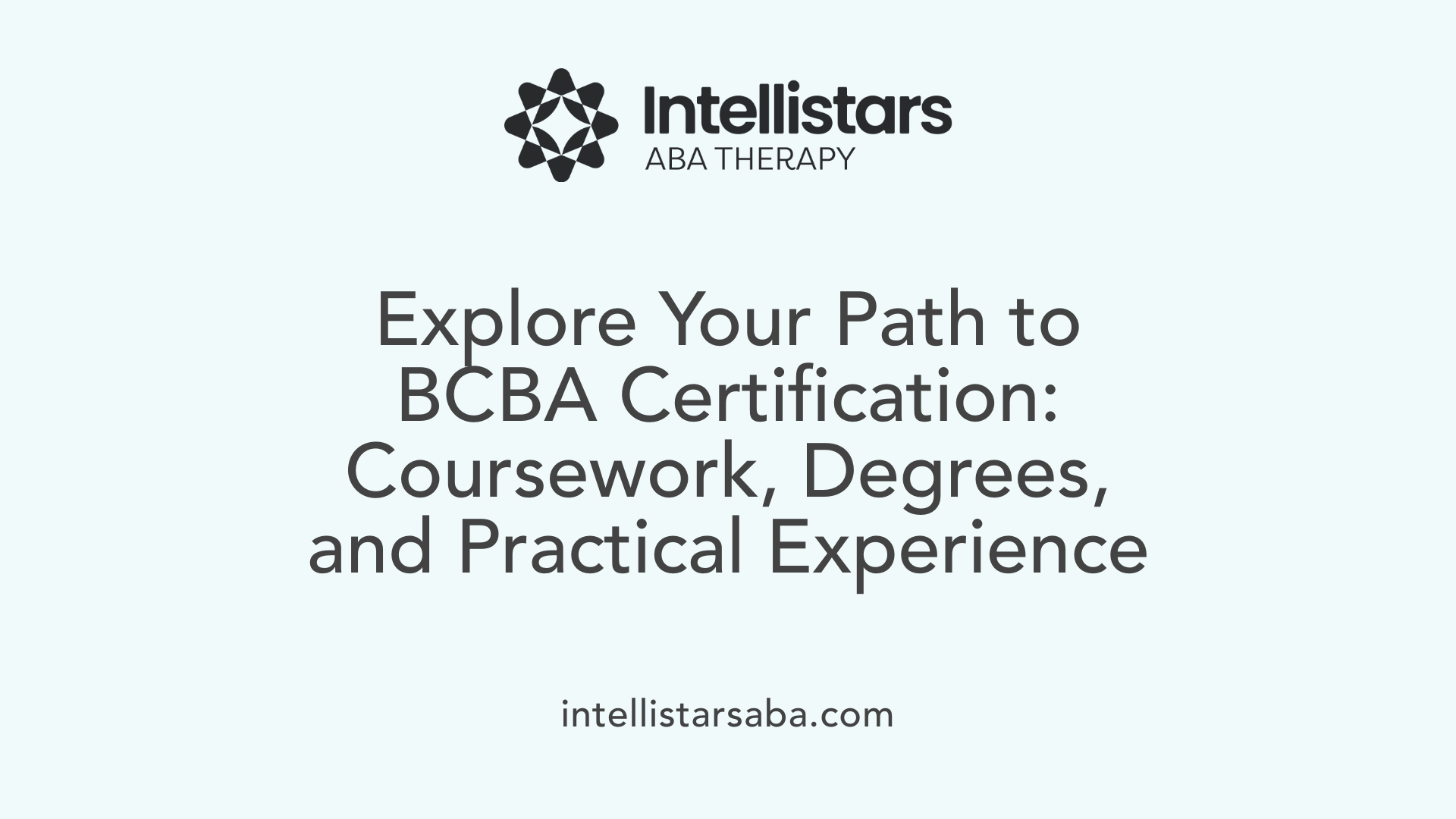 Becoming a Board Certified Behavior Analyst (BCBA) requires a clear educational route supported by accredited coursework and practical experience. The typical pathway begins with obtaining a graduate degree—either a master’s or higher—in behavior analysis, psychology, education, or a related field. Candidates should ensure their program is recognized by the Behavior Analyst Certification Board (BACB), the Association for Behavior Analysis International (ABAI), or the American Psychological Association (APA). Programs accredited or verified by these organizations confirm that the coursework aligns with industry standards.
Becoming a Board Certified Behavior Analyst (BCBA) requires a clear educational route supported by accredited coursework and practical experience. The typical pathway begins with obtaining a graduate degree—either a master’s or higher—in behavior analysis, psychology, education, or a related field. Candidates should ensure their program is recognized by the Behavior Analyst Certification Board (BACB), the Association for Behavior Analysis International (ABAI), or the American Psychological Association (APA). Programs accredited or verified by these organizations confirm that the coursework aligns with industry standards.
The coursework component is crucial. Candidates must complete a verified course sequence (VCS) totaling at least 315 hours. This coursework covers fundamental areas such as ethics, behavior principles, measurement, assessment strategies, and behavior-change procedures. These topics are designed to ensure candidates acquire a comprehensive understanding of applied behavior analysis.
In addition to coursework, supervised practical experience is required. Prospective BCBAs must accumulate between 1,500 and 2,000 hours of supervised fieldwork in applied behavior analysis. This hands-on experience involves conducting assessments, designing behavior intervention plans, implementing strategies, and monitoring progress, all under the supervision of qualified professionals.
Post-degree, candidates must ensure their coursework and practical experiences meet the standards set by the BACB. After completing these requirements, they can sit for the BCBA certification exam—a four-hour, computer-based test comprising 185 questions based on the current BACB Task List and Ethics Code.
Maintaining certification involves ongoing education, ethical practice, and recertification every two years. Overall, this pathway emphasizes a combination of rigorous academic study and real-world application, preparing professionals for effective practice in diverse settings such as healthcare, education, and clinical services.
Step-by-Step Process to Certification
What is the step-by-step process to obtain BCBA certification?
Becoming a Board Certified Behavior Analyst (BCBA) involves several carefully planned stages. Initially, prospective candidates should thoroughly review the BCBA Handbook provided by the Behavior Analyst Certification Board (BACB). This document outlines all eligibility requirements, including necessary education, coursework, and supervised experience.
The next step is to complete the relevant graduate coursework. Typically, this requires earning at least a master's degree in behavior analysis, psychology, education, or a related field from an accredited program. The coursework must include specific content areas aligned with BACB standards, including ethics, behavior assessment, and intervention strategies.
In parallel, candidates need to acquire supervised fieldwork experience. This involves completing between 1,500 to 2,000 hours of practical experience, conducted under the supervision of a qualified BCBA. Documentation of this experience is crucial for verification during the application process.
Once these prerequisites are fulfilled, candidates can apply online through the BACB website. They must submit proof of their degree, coursework completion, and supervised hours. The application also requires paying applicable fees.
After receiving approval, candidates can schedule their exam at a Pearson VUE testing center. The BCBA exam consists of multiple-choice questions designed to assess the candidate’s knowledge of behavior analysis principles and practices.
Upon passing the exam—scoring at or above the required threshold—the individual receives their certification and can practice independently as a licensed behavior analyst. Certification maintenance necessitates earning continuing education units (CEUs) and adhering to ethical standards. Every two years, BCBAs must recertify, demonstrating ongoing professional development.
This systematic approach ensures that all certified BCBAs possess the necessary education, skills, and ethical standards to deliver high-quality behavior-analytic services and supervise other professionals in the field.
Certification Procedures: Exams, Scoring, and Retakes
The pathway to becoming a certified BCBA involves several procedural steps centered around an exam, scoring, and policies for retakes.
Initially, candidates must ensure their application is approved and then schedule their exam through the BACB-approved testing provider, Pearson VUE. The exam itself is a standardized, computer-based test lasting four hours, featuring 185 multiple-choice questions. Among these, 10 are unscored and used for exam data collection.
Examinations are offered at Pearson VUE testing centers globally, providing convenience and consistent testing environments. Candidates have up to eight attempts to pass the exam within a two-year eligibility window. If they do not pass on their first try, they must wait at least 30 days before attempting again, and each retake incurs a fee of $140.
Results are available immediately at the testing center, giving candidates quick feedback on their performance. The official passing score is a scaled score of 400 out of 500, calculated through a rigorous process called the modified Angoff method, which involves expert judgment to set the passing threshold.
Maintaining certification requires candidates to complete ongoing professional development via continuing education units (CEUs) and pay a recertification fee every two years. This process ensures that BCBAs stay current with evolving standards and maintain their competence.
Overall, the certification process combines comprehensive testing policies with ongoing professional requirements to uphold high standards within the field of behavior analysis.
Experience and Practicum Requirements for Aspiring BCBAs
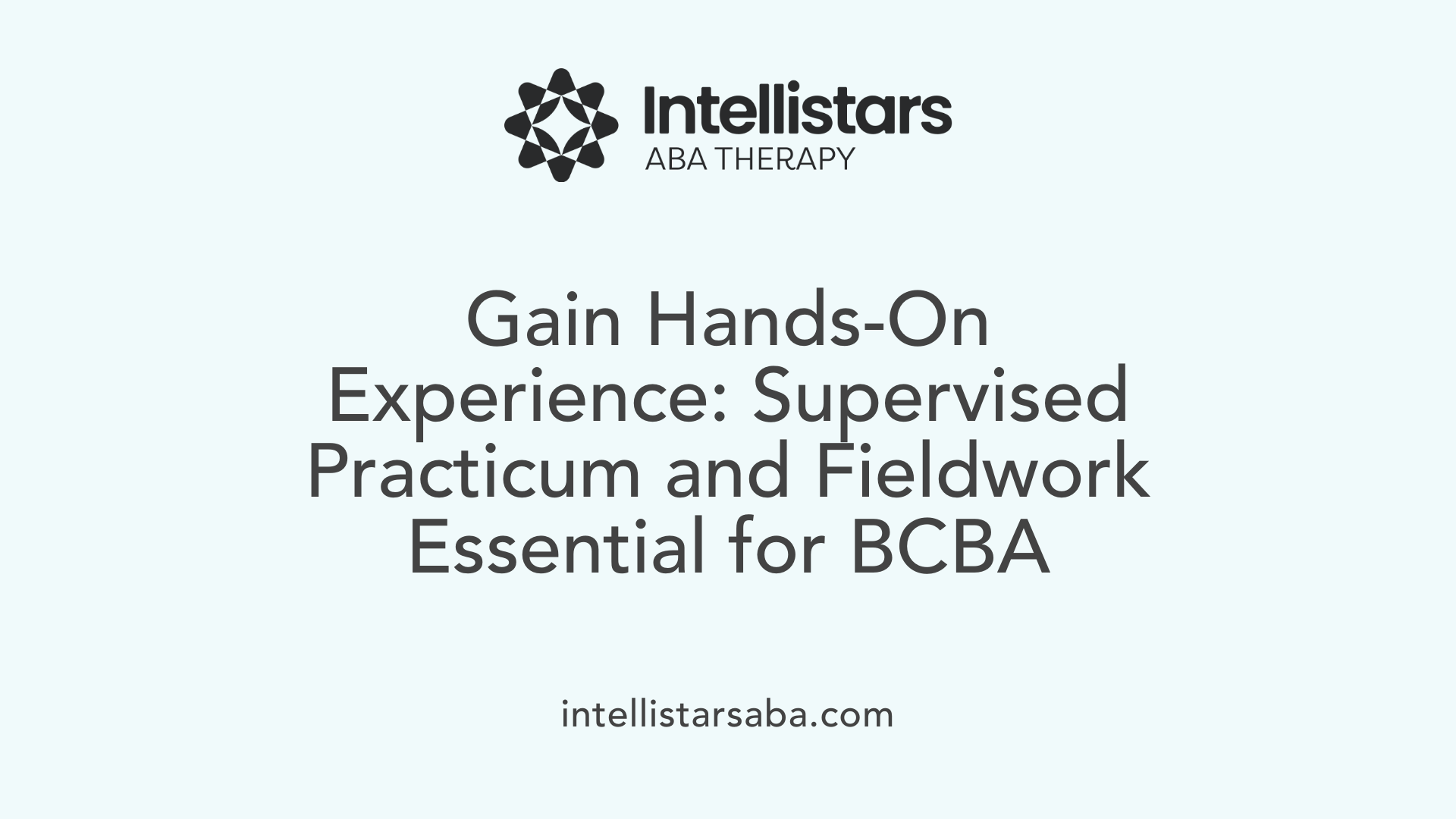
What experience and practicum requirements are needed for aspiring BCBAs?
Becoming a Board Certified Behavior Analyst (BCBA) involves several practical and educational steps. Candidates must first obtain a master's or doctoral degree in behavior analysis or a related field from an accredited program that meets the standards set by the BACB.
A significant component of the certification process is accruing supervised fieldwork hours. Depending on the pathway, individuals are required to complete between 1,500 and 2,000 hours of hands-on practicum in applied behavior analysis. This supervised experience ensures that candidates gain real-world skills in assessment, intervention, and behavior management.
During this practicum, aspiring BCBAs engage in activities such as conducting functional behavior assessments, developing behavior intervention plans, monitoring progress, and collaborating with clients and other professionals. These activities are crucial for practical learning and professional development.
Documentation of these supervised hours is essential. Candidates must complete verification forms, signed by qualified supervisors such as practicing BCBAs, to officially record their practical experience. This documentation serves as proof that the experience meets BACB standards.
Practical training often takes place in diverse settings like schools, clinics, hospitals, or clients' homes, providing exposure to various populations and behavioral challenges.
Passing the BCBA exam completes the certification process, assessing knowledge in behavioral assessments, intervention strategies, ethics, and organizational behavior management.
Maintaining the certification involves fulfilling continuing education requirements and adhering to ethical codes. This ongoing learning underscores the importance of staying current with developments in the field and ensuring high standards of practice.
| Requirement | Detail | Additional Notes |
|---|---|---|
| Degree | Master's or doctoral in behavior analysis or related field | Must be from an accredited program |
| Supervised hours | 1,500 to 2,000 hours | Depends on pathway; includes hands-on practical experience |
| Experience activities | Assessments, behavior development, monitoring, collaboration | Must be supervised by qualified professionals |
| Documentation | Verification forms signed by supervisors | Ensures compliance with BACB standards |
| Certification exam | Pass the BCBA exam | Focuses on assessment, intervention, ethics, and practice |
| Continued certification | Complete ongoing CEUs and adhere to ethics | Recertify every two years to maintain credentials |
Candidates aiming to become BCBAs should seek programs that offer comprehensive supervision, practical experience, and proper documentation to meet these standards. This structure ensures they are well-prepared to provide effective behavior-analytic services upon certification.
Maintaining and Renewing Certification
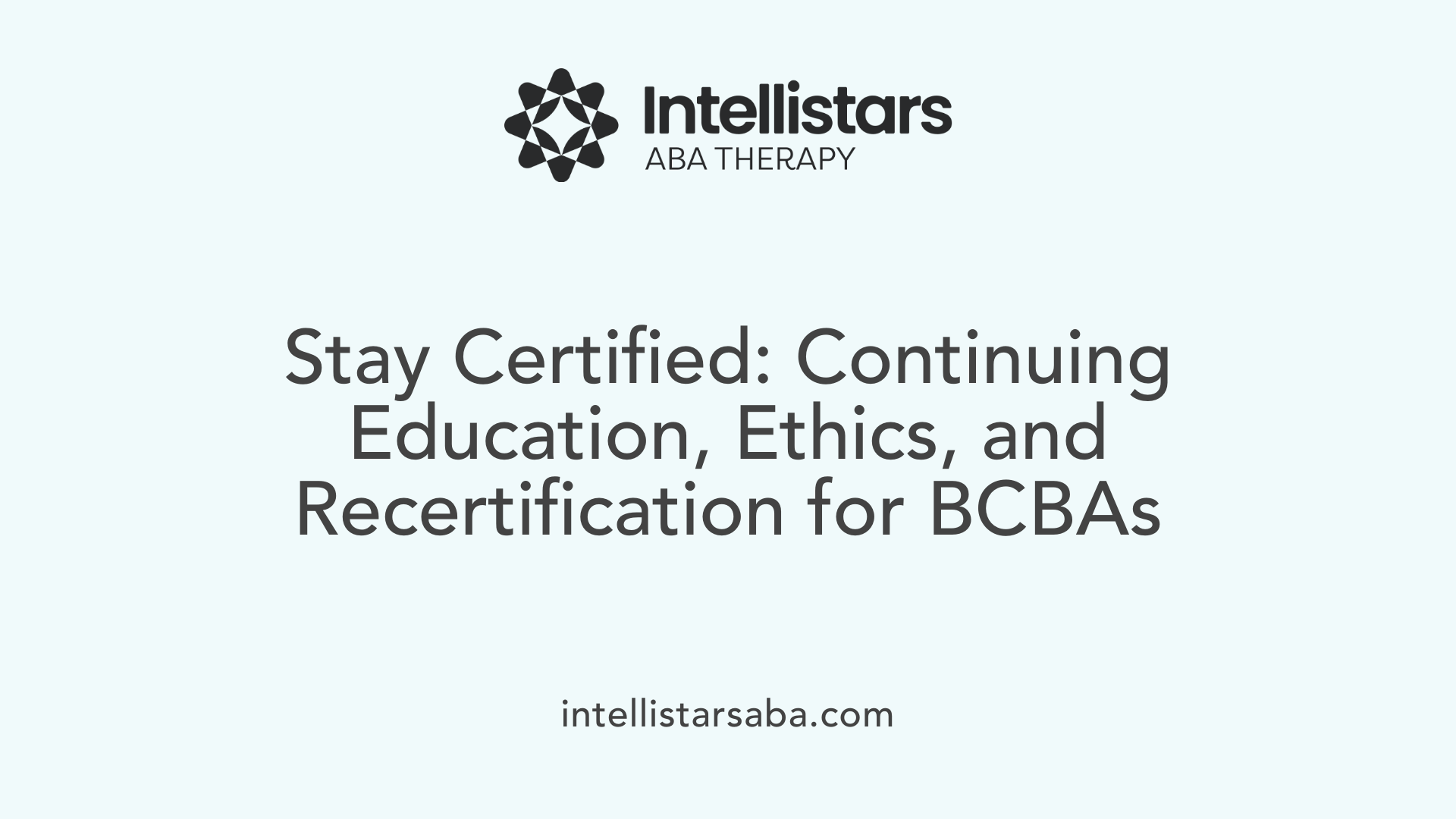
How do BCBAs maintain and renew their certification?
Once a professional becomes a BCBA, certification maintenance involves ongoing education, ethical practice, and timely renewal. The BACB sets clear standards to ensure BCBAs stay current and competent in their field.
To maintain their certification, BCBAs must complete 32 continuing education units (CEUs) every two years. These CEUs help professionals stay updated with the latest research, techniques, and ethical standards in behavior analysis.
Among these requirements, at least 4 CEUs must focus specifically on ethics. If a BCBA provides supervision to others, they also need to complete a minimum of 3 CEUs related to supervision practices. These requirements promote ethical and effective practice in diverse settings.
In addition to earning CEUs, BCBAs must submit a renewal application along with a renewal fee before their certification expires. This process involves confirming that they have met the CEU requirements and complied with the BACB's ethical standards.
Maintaining ethical practices is a critical aspect of certification renewal. BCBAs are expected to adhere to BACB’s ethical guidelines, which emphasize professional conduct, responsibility, and client welfare.
Tracking CEUs carefully and renewing on time are vital to retain active certification status. Professionals are encouraged to keep detailed records of their continuing education activities and submit renewal documents as required.
Overall, ongoing professional development, commitment to ethical practice, and adherence to renewal deadlines are essential to sustaining a successful career as a BCBA.
Career Opportunities and Professional Standards
What are the career prospects and professional standards for BCBAs?
The outlook for Board Certified Behavior Analysts (BCBAs) is very promising due to growing needs in healthcare, education, and private practice. As of 2023, there are over 59,000 BCBAs in the U.S., with the field expanding rapidly—projected growth of 68% from 2020 to 2025. This increase reflects the rising demand for behavior analytic services across various settings.
BCBAs hold diverse roles, including conducting behavioral assessments, designing and implementing intervention plans, supervising other professionals such as Registered Behavior Technicians (RBTs) and BCaBAs, and collaborating with families, schools, hospitals, and organizations. Many specialize in areas such as autism spectrum disorder, clinical behavior analysis, behavioral health, and organizational management.
Maintaining professional standards is a fundamental aspect of BCBA practice. BCBAs must adhere to strict ethical guidelines set by the Behavior Analyst Certification Board (BACB), participate in ongoing professional development, and complete recertification requirements every two years. The median annual salary for BCBAs is around $74,000, with experienced practitioners earning up to $90,500 or more.
For professionals seeking further advancement, the optional BCBA-D (doctoral) designation provides opportunities for specialization and leadership. Overall, the profession offers a stable and rewarding career path, driven by increasing societal recognition of behavioral analysis and mental health services.
Resources for Preparation and Continuing Education
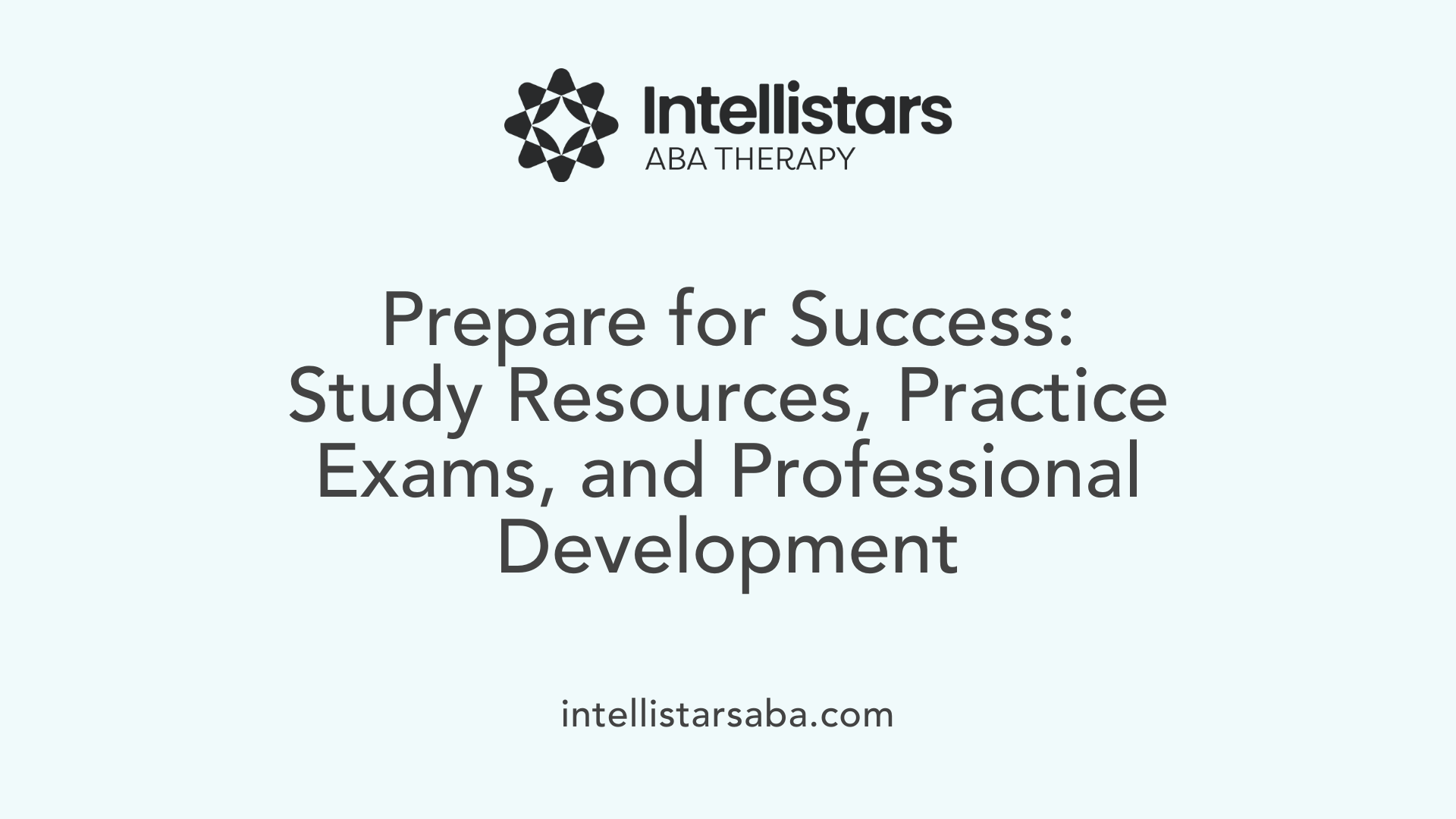 Candidates preparing for the BCBA certification can access a broad range of resources to enhance their readiness. Study guides, textbooks, and practice exams are fundamental tools that help familiarize candidates with exam content and question formats.
Candidates preparing for the BCBA certification can access a broad range of resources to enhance their readiness. Study guides, textbooks, and practice exams are fundamental tools that help familiarize candidates with exam content and question formats.
Online platforms such as ABA Knowledge Builder offer unlimited mock exams, flashcards, and courses designed specifically for behavior analysts. The CBA Learning Module Series provides structured modules featuring over 3,500 questions aligned with the BACB’s sixth edition Task List, which is currently in use.
Official content outlines and exam tips are available through the BACB and Pearson VUE websites. These resources provide valuable guidance on key topics, exam structure, and testing procedures.
Developing a detailed study schedule is highly recommended to ensure comprehensive coverage of all content areas. Applying concepts to real-life scenarios helps reinforce understanding and practical skills.
Support from peers, professional courses, and study groups can significantly boost confidence and knowledge. Engaging with these resources allows candidates to identify weak areas and improve through targeted practice.
Utilizing a combination of these tools can greatly increase the likelihood of success in the exam and support ongoing professional development in applied behavior analysis.
Your Path to Professional Excellence in Behavior Analysis
Becoming a BCBA combines rigorous academic training, hands-on experience, and successful examination performance. By adhering to the standards set by the BACB, maintaining ongoing professional development, and engaging in ethical practice, aspiring behavior analysts can build a rewarding career that positively impacts individuals and communities. The field offers diverse career opportunities, specialization potential, and competitive salaries, making the journey toward BCBA certification both challenging and highly fulfilling. With careful planning, dedication, and access to quality resources, you can achieve your goal of becoming a recognized expert in behavior analysis and contribute meaningfully to the field.
References
- Board Certified Behavior Analyst
- BACB - Behavior Analyst Certification Board
- Board Certified Behavioral Analyst Career Overview - Psychology.org
- How To Become a Board Certified Behavior Analyst
- How to Become a Board Certified Behavior Analyst (BCBA): Five Steps
- [PDF] BCBA Handbook - BACB
- What is a BCBA? Your Guide to the BCBA Certification & Exam
- Online Behavior Analyst Graduate Certificate - Florida Tech
- EXAMINATION INFORMATION - Behavior Analyst Certification Board
- Board Certified Behavior Analyst - BCBA






